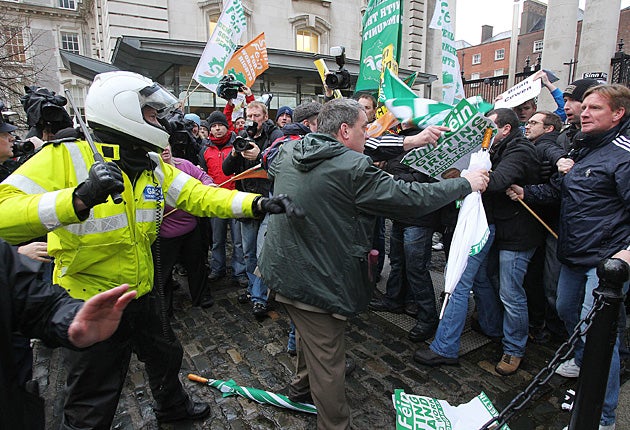Irish PM is forced to call election as €90bn bailout sparks unrest
Deal agreed but coalition falls apart – and Europe fears Spain is at risk

An extraordinary day in Irish politics ended in a major setback for Brian Cowen's government last night after his coalition allies forced him to concede an election as soon as his budget goes through.
The Green party, which has kept Mr Cowen's Fianna Fail in power for several years, effectively pulled the plug by calling for an election in January, giving him little notice of its demands.
After a day of frantic activity in which it became clear the government would not last beyond January, the Irish Prime Minister gave way to the demands of the Greens, who specified they would stay in government until the budget was passed and an agreement hammered out with the IMF, EU and European Central Bank.
Mr Cowen's sudden announcement transformed the Dublin political landscape at exactly the moment that the intervention of the international European institutions changes the economic landscape.
The main opposition parties meanwhile repeated their demands for an immediate election, in the knowledge that Fianna Fail is so unpopular that it is bound to be swept from office whenever a contest is held.
Officials from the IMF, EU and ECB continued their work in Dublin on a programme designed to enact widespread cuts and new taxes to the tune of €15bn (£13bn). They are expected to provide up to €90bn in funds and promises.
As far as the EU is concerned, the precise complexion of the Dublin government is less important than securing a deal and avoiding the "contagion" that so nearly destroyed the euro itself during the Greek crisis.
Portugal and Spain are the next nations in danger. "Of course if Spain does get caught in the crosshairs, it's going to be an absolute nightmare for Europe because it just can't bail it out. It hasn't got the facilities," David Morrison, market strategist at GFT Global, said. Confidence in Ireland, already at a low level, could dip further if scenes of social unrest follow demonstrations being called by the trade unions. For now, it remains unclear whether the Ireland bailout will be conditional on a rise in her corporation tax rate, currently 12.5 per cent, the lowest among EU countries.
Resented by the UK, France and Germany, it is a "red line" for Irish negotiators. The risk with making Ireland push it up, as with the expected budget cuts, is that such moves might actually deprive Ireland of the ability to grow her way out of trouble.
Some six months after her bailout, Greece's position remains precarious, partly for that reason. By January at the latest, a general election will sweep the deeply unpopular Fianna Fail party from power. But by then the EU and IMF hope that the Irish parliament will have accepted a four-year plan and a budget making cuts of €6bn.
The government's four-year plan is due to be unveiled tomorrow with the budget to follow on 7 December. But there is no absolute assurance that the budget will pass, since yesterday independents – who normally support the administration – announced they are highly unlikely to do so. The fact that Mr Cowen's troubled administration had finally run out of road emerged on a day of fast-moving developments triggered by the Green party's call for an election.
The Greens said they wanted an election because "the past week has been a traumatic one for the Irish electorate – people feel misled and betrayed." This was followed by more bad news for Mr Cowen when the independents threatened to vote against his budget.
Several of his own backbenchers also weighed in, calling on him to resign, while a senior party figure said the party should gather after Christmas to consider its leadership. A former minister, Mary O'Rourke, said of Fianna Fail members: "They are confused. There is distinct worry about the future of the party. We can't run around in circles any more."
The day had not started so badly for the government. Until the announcement by the Greens, the markets had reacted favourably to economic developments. The "risk premium" demanded by investors to hold Irish government bonds had fallen, indicating that they felt a general meltdown in the eurozone was becoming less likely. But fears of contagion to other eurozone nations remain. The Portuguese Prime Minister, Jose Socrates, said he hopes emergency funding for Ireland will end uncertainty in the financial markets: "[Portugal] does not need any help. What the country needs is to approve the budget, and to continue in its efforts [to cut its deficit]."
But it was not long until the major opposition parties were calling for an immediate election. Dublin politics was thus plunged into a swirl of uncertainty about whether Mr Cowen could get his budget through and whether he personally will survive the crisis.
While Mr Cowen's Fianna Fail party is the most efficient election machine in Ireland, with support at a dismal 19 per cent it stands no chance of re-election. It is universally expected to be displaced by a coalition of the two biggest opposition parties. Although some speculated that Fine Gael might facilitate Mr Cowen in getting his budget through, the party warned that it would not give the government a blank cheque. Mr Cowen said last night that he wants to continue in his job. Asked if he would lead his party into the next election, he said it was an issue for the party to decide.
Join our commenting forum
Join thought-provoking conversations, follow other Independent readers and see their replies
Comments
Bookmark popover
Removed from bookmarks